#National Theatre Live: Angels in America Part Two: Perestroika
Text
Andrew Garfield Filmography Part 2
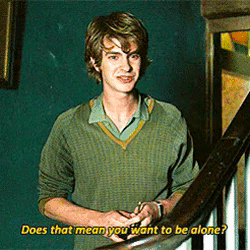
Never Let Me Go (2010)

The Social Network (2010)
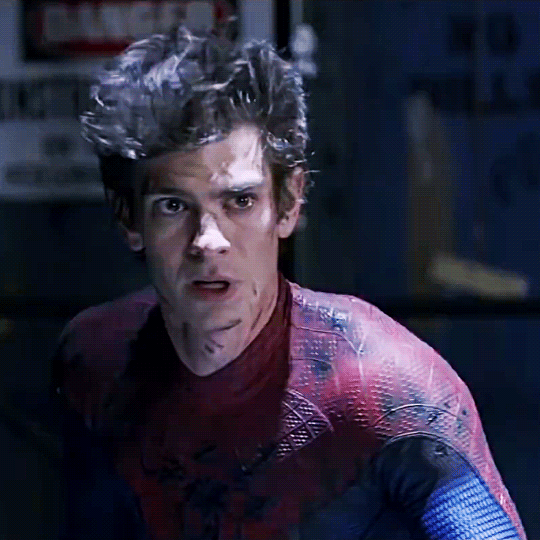
The Amazing Spider-Man (2012)
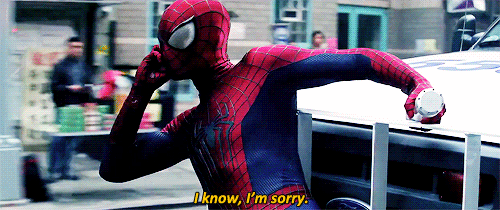
The Amazing Spider-Man 2 (2014)
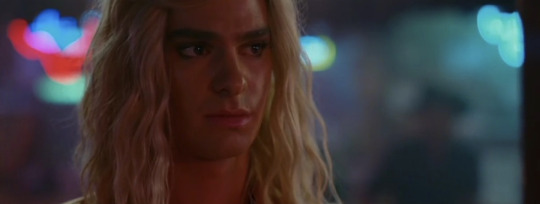
Arcade Fire: We Exist (2014)

99 Homes (2014)
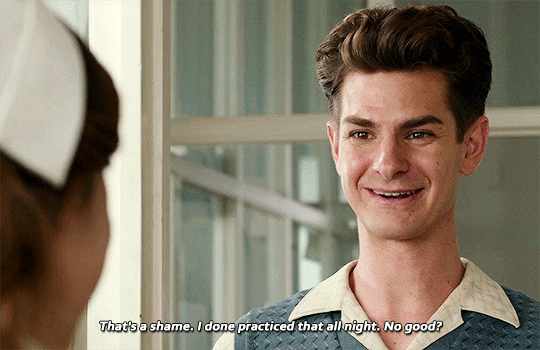
Hacksaw Ridge (2016)
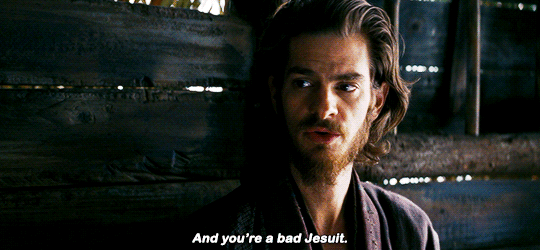
Silence (2016)
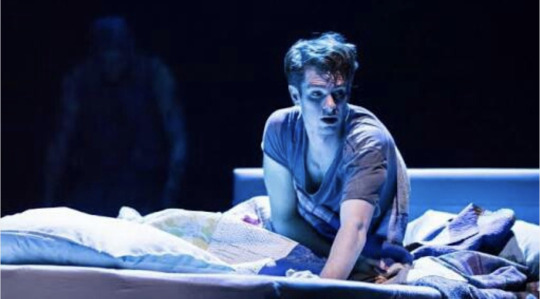
National Theatre Live: Angels in America Part Two: Perestroika (2017)

Breathe (2017)
#andrew garfield#Never Let Me Go#The Social Network#The Amazing Spider-Man#The Amazing Spider-Man 2#Arcade Fire: We Exist#99 Homes#Hacksaw Ridge#Silence#National Theatre Live: Angels in America Part Two: Perestroika#Breathe
109 notes
·
View notes
Note
how did u watch angels in america? I've been trying to watch it but i can't find it anywhere
i have to be soooooo honest i'm so sorry. i saw angels in america part one the millennium approaches live at london's national theatre w andrew garfield nathan lane denise gough etc etc etc and it completely pulled out my organs from my body and rearranged them and shocked them with electric eels and i could NOT get tickets to part two perestroika so i just. bought the play and read the second half and imagined what it might have been like in my brain. i can never ever find the bootleg but let me dig around some more.... the 2003 hbo miniseries is always pretty easy to find but the national theatre version is like. THE definitive experience yeah. i'll keep poking
23 notes
·
View notes
Text
『キャシアン・アンドー』登場舞台俳優まとめ
S1が完結した『キャシアン・アンドー』、UKでの撮影ということもあり当地の芸達者な舞台俳優が多数参加しているのも見どころ。ここではオンラインの配信サービスで見られる彼らの出演作をまとめた。なおここで紹介するものには日本語字幕はないので悪しからずご了承を
まずはロンドンのNational Theatreが提供している「National Theatre At Home」から。詳細はhatoさんがまとめられている以下のツイートを参照していただくのが一番早いかも https://twitter.com/hatoincident/status/1536673997857107968
・カイル・ソラー(シリル・カーン役)出演『ヘッダ・ガーブレル』
日本でも知られてきたイヴォ・ヴァン・ホーヴェ演出
https://www.ntathome.com/products/hedda-gabler
・デニース・ゴフ(デドラ・ミーロ役)、ジェームズ・マカードル(ティム・カーロ / ビックスの彼役)出演『エンジェルス・イン・アメリカ 至福千年紀が近づく(前編) 』
https://www.ntathome.com/products/angels-in-america-part-one-millennium-approaches
・同じく『エンジェルス・イン・アメリカ ペレストロイカ(後編)』
https://www.ntathome.com/products/angels-in-america-part-two-perestroika
・フィオナ・ショウ(マーヴァ・アンドー役)出演『London Assurance』
https://www.ntathome.com/products/london-assurance
・スーレ・リミ(ゴーン / アルダーニで反乱勢力に協力する帝国軍将校役)出演『三人姉妹』
https://www.ntathome.com/products/three-sisters
・ジョシュア・ジェームズ(ドクター・ゴースト / ビックスの拷問官役)出演『宝島』
https://www.ntathome.com/products/treasure-island
・ルパート・ヴァンシタート(ハイン / シリルのプリ=モーでの上官役)出演『This House』
https://www.ntathome.com/products/this-house
・ズビン・ヴァーラ(ザン / フェリックスの労働者で協力者役)出演『Dara』
https://www.ntathome.com/products/dara
・Joplin Sibtain(ブラッソ役)出演『オセロー(2013年版)』
https://www.ntathome.com/products/othello
続いてロンドンのグローブ座が提供しているGlobe Playerでも彼らの出演作品が。
・デニース・ゴフ出演『マルフィ公爵夫人』
https://player.shakespearesglobe.com/productions/the-duchess-of-malfi-2014/
・ジョシュア・ジェームズ出演『テンペスト』
こちらはミランダ役がジェシー・バックリーですな
https://player.shakespearesglobe.com/productions/the-tempest-2013/
Digital Playerでは
・カイル・ソラーが登場している『夜への長い旅路』
https://www.digitaltheatre.com/watch/37630618
・シリルの母親イーディ役のキャスリン・ハンターが出演している『カフカの猿』も
https://www.digitaltheatre.com/watch/37630646
上記サービスには登場していないが、他だとモン・モスマの旧い友人で金工面を相談されるタイ・コルマ役のベン・マイルズは先日National Theatre Liveでも公開された『リーマン・トリロジー』のエマニュエル(他)役だったり https://www.youtube.com/watch?v=oA5HazmRtmI
他にも登場を確認できていない俳優の見落としが多数あると思いますが、ひとまずこのあたりで!
なお、情報提供においてはhatoさん とannnaさん に感謝いたします。
1 note
·
View note
Text
march reading
kinda forgot about this i guess. anyway feat. uh, magical ships, dubious mental health institutions (plural) & a parisian building with 99 rooms.
the forever sea, joshua phillip johnson (forever sea #1)
i firmly believe that more fantasy lit should be set on ships bc ships are inherently a sexy setting & you could have pirates which are extremely sexy. this has ships (and pirates) and also a sea made of grass? a magical plant sea on which ships sail via magical fires, so conceptually i’m very into it all. the plot is fine, but the protagonist kindred has a very bad case of Main Character Syndrome so prepare for mild annoyance throughout. also while i generally enjoy book magic vs wild magic i wish more works would treat them as two ends of a spectrum rather than ~book magic bad and boring, wild magic cool and *~natural*~. but overall i think this series has potential. 3/5
jagannath: stories, karin tidbeck ([partially?] translated from swedish by the author)
really cool collection of sff stories by tidbeck, many of which veer into mild horror and some of which are influenced by swedish folklore and especially swedish fey stories. i enjoyed most of these a lot, especially the existential call centre horror story, the ‘god won’t let me die’ one, and a taxonomy of a cryptid that goes a little off the rails. 4/5
annette, ein heldinnenepos, anne weber
a novel in verse about anne beaumanoir, a real person who was a résistance member during world war 2 and later supported the algerian national liberation front, for which she was sentenced to 10 years in prison (she escaped to tunisia and later algeria). she’s clearly a very impressive and interesting person & i conceptually enjoyed the idea of writing a modern hero(ine)’s epic, but i feel like the language could have been a bit more stylized to match the form. 3/5
salvage the bones, jesmyn ward (audio)
bleak but ultimately hopeful novel about a black family in the days before and during hurricane katrina, although the focus is on the family dynamics, the 14-year-old narrator discovering that she is pregnant, and the kids trying to keep the puppies their dog china just had alive and well. enjoyed this, altho i did it a bit of a disservice but listening to it a lot of short chunks. 3.5/5
regeneration, pat barker (regeneration trilogy #1)
set mostly at a military hospital for soldiers with shell shock during world war 1, this novel explores the existential horror of war, psychological treatment (& the horrible absurdity of treating traumatised men just enough so that you can send them straight back to Trauma Town), and the meeting between siegfried sassoon & wilfred owen. i find i don’t really have much to say about it, but it is very, very good. 4/5
how to pronounce knife, souvankham thammavongsa
a short story collection mainly about refugees and migrants from laos to canada, many focusing on parent-child relationships and being forced to work in low-paid jobs, often ones that are damaging to their health. the stories are very well-observed and emotionally nuanced and detailed, but with 14 mostly very short stories, the collection as a whole felt a bit samey, which i guess is something i often experience with short story collections. 3/5
faces in the water, janet frame
horrifying semi-autobiographical novel about a young woman stuck in new zealand’s mental health system, moving to different hospitals but mostly from ward to (more depressing) ward in the 40s/50s. while there is a shift in attitudes during her stay that sometimes makes the wards more tolerable, mostly the patients are neglected, abused, and the threat of electric shock therapy and lobotomy always hangs over them. 3/5
the upstairs house, julia fine
fuck why did i read so many books about mental health conditions this month??? this is another entry in my casual ‘motherhood as horror’ reading project, in which a new mother develops post-partum psychosis & imagines the modernist children’s book writer she’s writing her dissertation on and her poet sometimes-lover haunting her and her child (margaret wise brown & michael strange, who are real people i was utterly unaware of). this does pretty good on the maternal horror front, but i wasn’t entirely sold on the literary haunting. 2/5
1000 serpentinen angst, olivia wenzel
a very interesting novel about a woman struggling with grief over her brother’s suicide, an anxiety disorder, the (non)state of a (non)relationship and discrimination/marginalisation based on her identity as a black, east-german, bi woman (while also being, as she notes, financially privileged). much of the novel is written in a dialogue between the narrator and an unnamed (& probably internal) interlocutor, which was p effective for a novel more focused on introspection than much of a plot. 3/5
atlas: the archaeology of an imaginary city, dung kai-cheung (tr. from chinese by the author, anders hansson, bonnie mcdougall)
fictitious theory about a slightly-left-of-reality version of hong kong and how maps (re)construct the city, very heavy on the postmodern poststructuralist postcolonial (and some other posts, i’m sure). in many ways my jam. unfortunately my favourite parts of this were the author’s preface and the first part (fictitious theory of mapping alternate hong kong); the rest felt very repetitive and not particularly interesting, altho i’m sure i was also just missing a lot of cultural context. 2.5/5
under the net, iris murdoch
.........i liked the other two murdochs i’ve read (the sea, the sea & a severed head) quite a lot so either i was not in the mood for her very peculiar style of constructing novels and characters or, this being her first novel, she just wasn’t in full command of that peculiar style yet but man this was a slooooooooog. don’t stretch out your modern picaresque with an incredibly annoying narrator over more than 300 pages iris!!!! 2/5 bc this probably has some merit & i just wasn’t into it
the impossible revolution: making sense of the syrian tragedy, yassin al-haj saleh (tr. from arabic by i. rida mahmoud)
collection of articles and essays saleh (a syrian intellectual & activist who spent 16 years in a syrian prison) wrote from 2011 to 2015, analysing the reasons for, potential and development of the revolution, as well as some background sociological discussion on the assads’ regime. very interesting, very dense, very depressing. wouldn’t necessarily recommend it as a first read on the topic tho. 3/5
angels in america: millenium approaches & perestroika, tony kushner
the page to tumblr darling quote ratio in this is insane (”just mangled guts pretending” and so on) and also it just really slaps on every level. also managed to get me from 0 to crying several times. brilliant work of theatre, would love to see it staged (or filmed). 4/5
life: a user’s manual, georges perec (german tr. by eugen helmlé)
99 chapters, each corresponding with a single room in a parisian apartment block; some chapters are basically ‘here’s the room, here’s a long list of objects in the room, that’s it bye :)’, some are short insights into the lives of the people living there, some (the best, mostly) are long, absolutely wild tales that are sometimes only tangentially connected to the room in question. why are the french like this. 61/99 rooms
sisters in hate: american women on the front lines of white nationalism, seyward darby (audio)
nonfiction about women’s role in white nationalist hate movements, mainly based on the stories of three women who are or have been involved with various contemporary american alt-right/racist/neonazi hate groups, while also looking at general social trends and the history of white women’s role in white supremacy. interesting and engaging if you’re interested in this kind of thing. if you’re both politically aware and internet poisoned, it’s probably not much that is completely new to you but still worth reading. 3/5
starting in april i will be Gainfully Employed (ugh) & thus probably not read as much or read even more bc i have no energy for anything else
6 notes
·
View notes
Text
Interview with Pulitzer Prize Winning Playwright TONY KUSHNER

Known for his groundbreaking works including the Pulitzer Prize-winning Angels in America and the Olivier-awarded Caroline, Or Change, Tony Kushner has become one of the most prolific playwrights of our generation. I sat down with Mr. Kushner who was in Chicago to receive the Chicago Tribune Literary Prize as part of the Chicago Humanities Festival.
MJR:Let’s talk about The Intelligent Homosexual’s Guide to Capitalism and Socialism with a Key to the Scriptures, a new work that you developed at the Guthrie Theatre in Minneapolis this past year. How did the concept come to fruition for you?
TK: The way all ideas come about. I had been thinking for a very long time about writing it a play that dealt specifically with LGBT issues and I had also been thinking of dealing with Marxism onstage in the Perestroika era. I’ve always wanted to do something about American Marxism or American Communism specifically so all of that came together when Joe Dowling asked me to do a new play for the celebration that the Guthrie did of my work. They performed Caroline, Or Change and 5 short plays last spring.
MJR: Speaking of Caroline, Or Change, the Chicago production mounted by Court Theatre won four Joseph Jefferson Awards including Best Musical was an unequivocal success. Tell us about your partnership with Jeanine Tesori during the development of Caroline.
TK: Jeanine is an amazingly talented composer. In my opinion the best composer writing for the theatre living. I am enormously happy and consider myself very fortunate that we hooked up. I never enjoyed working with anyone as much as I enjoyed working with Jeanine. We’re currently working on a new piece together.
MJR: Story-wise, Caroline, or Change explored your upbringing in Louisiana. What was the process of transferring a semi-autobiographical narrative to the musical stage?
TK: Well of course Caroline is a fictional character. The character is loosely based on the woman who worked as a maid for my family when I was a kid. It was actually dedicated to her. She just turned 80. There are episodes and certain details in the play that are absolutely from my childhood. I grew up in Louisiana. But the piece is not autobiographic in any kind of reliable sense. The character of Caroline is some degree based on but many of the details of her life are different.
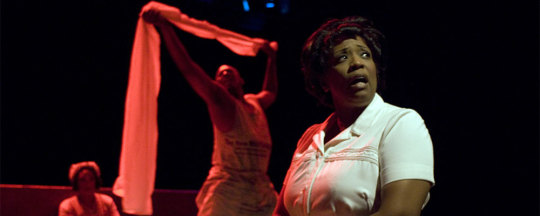
Jeff Award Winner E. Faye Butler in CAROLINE OR CHANGE
MJR: As a playwright, what was the most challenging component of musicalizing text to propel a narrative?
TK: I wrote the whole thing before I started working with Jeanine so in a way it was like writing a play. It was in a loosely rhymed and metered verse. To some degree it’s like learning a new language because there’s a lot about musical theatre that requires very specific skills that I do not have. I have very little experience working with the form. So I was guided to a great extent by Jeanine and by George Wolfe . But there was a lot that I had to learn about how to construct a moment with music.
Caroline is essentially an opera, it’s through-composed. We were both learning a lot while we were doing it. I’m working with Jeanine now on a new piece and I’ve already begun things I didn’t know. In some ways Caroline was easier than most of the plays that I’ve done because it was so much more collaborative. Once I had written a libretto in the first draft I began to work with Jeanine very closely; I wrote the words, she wrote the music with much overlap. We went through every word and every note very thoroughly. I had to learn a very different tempo in terms of how to do re-writes because if you’re doing a musical and you exchange a line, that changes any of the music. And in previews you’re dealing with giant and very cumbersome machinery, and orchestrations. The singers have to learn the music which is a very different process than just learning a new line so it was complicated.
MJR: The musical spurred quite a reaction here at Chicago’s Court Theatre. Have audiences received the show differently in varying parts of the country?
TK: I actually haven’t seen it in the South yet. It’s been done in a few places including Lake Charles. Everywhere that it’s been done it’s been very successful, people have responded with great enthusiasm. It was a big hit in London, it won the Olivier award. It’s done very well everywhere. Certainly there are times when it’s felt very different. Jeanine and I came out to see it in Chicago right before the election, right down the street from the Obama house. That was certainly a different kind of feeling, kind of an electric and exciting feeling to be let into the Court in the anticipation of the election.
Last spring when it was at the Guthrie it was interesting to see the play post-Obama. Obviously the line when Noah says Caroline is the President of the United States meant one thing 45 years ago. Now when there actually is an African American president in the United States it has a slightly different quality. That’s true for most plays today; the surrounding context changes in locale and time, and they become different.

MJR: HBO has been showing Angels in America for the past month. That dramatic sequence was groundbreaking for several communities. How do you think LGBT issues have shaped theatre in the past two decades, and how has theatre informed the community?
TK: Well I don’t think my play . I think that one could say that with Larry Kramer’s The Normal Heart. It coincided with relating to the AIDS epidemic for our community. Angels in America came around later. I have no idea what Angels did or didn’t accomplish beyond the fact that it’s a good play. And that’s the most I ever hoped for.
The question of the relationship between LGBT politics and theatre is an interesting one. Obviously an enormous number of people who work in theatre are from the sexual minority area and community. I think there’s a reason for that. It’s where we’ve been contributing to theatre in percentages disproportionate to our percentage in the normal population. And I think that on one hand it’s the case that communities of the oppressed very often find a home in the theatre because people who are oppressed learn the difference between what something seems to be and what it actually is; irony, which is an important ingredient in the theatre, the shaking of reality- these are all things that are part of the everyday life of everyone who has a lived experience of oppression.
So I think it makes sense that we would be found in greater numbers in the theatre. Theatre is always very quick to respond to moments of social crisis because it doesn’t take any money or particular organization of capital to make a play. You just find a good writer, actors, director, and a theatre willing to do it and you can put together a play about any subject fairly quickly, certainly much more quickly than you can with most instances of film or television. Theatre is always a good quick response. It is also the place that we go to in order to grapple with social issues of real moment.
If you allow Angels to be anything other than a good play, it allowed for a moment in the early 90s at the end of the first chapter to provide a public place for mourning the people who had died in the phase of the epidemic. It was also way of celebrating the end of the Reagan era; there was a great deal of release when Clinton beat the first Bush. We thought, however incorrectly, that we had closed the door on the nightmare of Reaganism which was a pernicious ideology that appeared at the same time as the AIDS virus. So I think that the play was about those things, connected to those things, and provided a public opportunity.
MJR: You just finished wrapping up a new screenplay on both the life and work of Abraham Lincoln for Steven Spielberg. What provokes your interest in this particular era of our nation’s history?
TK: I worked on for the last three years. We’re working on moving it into the next phase. It’s the time period where every tension and every unresolved conflict in American history prior to the Civil War came to a boil, and eventual explosion. Everything that this country is struggling to become emerges from the crucible of the Civil War. I think Abraham Lincoln, in my opinion, is inarguably our greatest president and one of the greatest people that ever lived- just a completely remarkable figure. I am tremendously interested in him and in his era.
MJR: Your stage works are inherently both dialogic and dialectic in form. What keeps your interest in film as a narrative medium, especially since it is often one that focuses on the monologic story?
TK: I think film is an extraordinary medium. Many great works of art in the 20th century were created by filmmakers. I feel that’s it’s more narrative driven than theatre, it’s certainly more all-encompassing kind of illusion. I think it doesn’t play as much as theatre does with questions of illusion and reality. To a certain extent I feel as though film is a degree more isolating, it’s perhaps less of a communal experience, though certainly the thing that all the audience’s attention is focused on does not respond to what the audience is telling it.
It’s the same from one showing to the next. Obviously there are some stories that cannot be told onstage that can be told on film, there’s just a mathematical question of how many individuals can be reached by a film or television show as opposed to theatre. For me there’s a certain pleasure in surrendering the absolute authority; a playwright in the theatre has, if nothing else, the authority that comes from property ownership. I own the play, I rent the play to the producers, directors, and actors to perform, but it’s mine.
When people get together to do a play one of the only common grounds they have to stand is the script. In film, it’s much more the director. The playwright doesn’t own his or her own words. It’s interesting to me and in some ways enjoyable to hand that authority over to somebody else and to be one person among a number who is working to create this final product, but not the person who finally has the decisive say in what it’s going to be. I’ve gotten to work with a few artists I admire enormously Steven Spielberg, Mike Nichols…that’s been thrilling. I got to watch both of them make a movie and I’ve learned a lot from doing that.
MJR: You’ve noted before your concern of reducing characters, specifically individuals like Lincoln, into dramatic figures. Do you employ a different approach in humanizing characters for the stage as opposed to a screen medium?
TK: Hamlet is a dramatic character, but there’s no reduction in Hamlet. I could think of a dozen film characters as rich as any human being could be. Lincoln is a genius on the level of Mozart or Shakespeare and it’s very difficult and possibly impossible for someone who isn’t a genius to come to any kind of understanding of how Lincoln did what he did. I think that it’s probably impossible for us to know those things.
To try and create a dramatic device that is going to deliver the secret of Lincoln’s inner genius or the secret of how Mozart wrote the Requiem or how Shakespeare wrote Hamlet is kind of nonsense. You can’t do that. These are leaps of the human imagination that are so vast and so extraordinary, and rare, that they’re really in a certain sense immeasurable and incomprehensible. What we have is the consequence which is somewhat immeasurable and incomprehensible.
There is no one who will ever say everything there is to say about Hamlet, it’s infinite as much as any human creation can be called infinite. I don’t feel that there is any necessary for dumbing down or reducing my ambition as a playwright because I am writing a screenplay. I feel that I can write characters that are just as rich onscreen as they are onstage. There are certain requirements that the forms have that are very different; language is different, the way you construct a character for a script that hopefully many different people will use or perform is different than when you’re writing a script for a director for one movie. So you have a sense that what you are doing is much more for a specific moment.
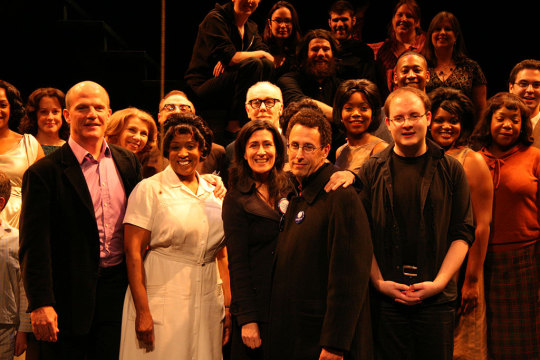
Tony Kushner, Jeanine Tesori at Court Theatre's CAROLINE OR CHANGE.
MJR: Tell us about your process of developing a new work for stage production.
TK: I don’t feel that I ever get inspired to do anything. Various impulses come at me during the course of a day just as they came at anybody. I read stories or I remember things that I’ve seen that seem of interest to me because I’m a playwright, that’s my job. I take note of those things and I write them down. If something that I’ve seen or been intrigued by sticks around, I’ll start to wonder if there is something in it that might become a play. If I feel clearer and clearer about why it’s interesting to me- whether it be a person, image, or event in history- I’ll start to keep a separate notebook about it and start to think of what could come as the basis of a play. You mull over five or six things at a time and for one reason or another one of them will the surface.
MJR: Do you often find yourself become reclusive during this process?
TK: I certainly try to . You should. It’s a good idea to do that. It’s always a mistake to not make that kind of time, but it’s one of the hard things about being a playwright. Part of our time is spent in rooms with a lot of people. Isolation is hard for everybody but for some people it’s easier. If you can’t handle isolation you certainly should not be a novelist or a poet.
Playwrights I think in general have a tricky balancing act to do between providing material for the excitement and electricity and sexual heat of a rehearsal room-also the fun and terror of being in the theatre with an audience- and being alone in a room. When I’m really deep in the first draft of a play or screenplay I become slightly antisocial. It’s very hard to talk to people, to be out in the world. I think that everybody who writes experiences this to some extent.
You have to kind of smooth your skin away and become available to becoming other people, so you lower boundaries and you remove skin and you make yourself slightly less well-organized than you are in everyday life. It’s hard to go out in public that way. I think it’s easier if you can get the play done in the first draft and then resume your public life; otherwise I think you feel sort of unpresentable and you probably are .
Read the full article
2 notes
·
View notes
Text
Angels Abounding [-fall 2010]
I first found Angels in America at age twelve in a moment consumed by consumerism, a chance encounter in a now-closed bookstore that left my life forever changed. The play has mostly been a thing of paper-and-binding for those my age (22 years old, let’s say)—not unlike the circumstances that bring Tony Kushner’s “Homebody” in the first act of Homebody/Kabul, another of his masterpieces, to the hat shop on “—” Street in London {Kushner does not have her name the street; it’s an authorial elision to be enacted in performance with the gestural sweeping of a hand.}, where she discovers her destiny: a journey vis-à-vis which she is ultimately lost, though Kabul is, for better or for worse, found. Buying something like a book can do that. For all its theatricality, Angels (as we may abbreviate it from hereon out) is not oft-performed in America, except for piecemeal servings in collegiate “Introduction to Acting” courses, where freshmen imitate Mormons and pill-poppers, as they sit bedside—beside the threshold of revelation, the un-bedding of truth. For those of us who have read it in one of its many published incarnations—hardcover or paperback, poster art by Milton Glaser or by the public relations team at HBO—there are always Angels bedside or on our library shelves, waiting to land (à la Spielberg) before us, for us to wrestle to the ground.
I couldn’t even afford Angels when I first encountered it, at the age of twelve (or maybe it was thirteen) in my local Border’s Bookstore, with its metallic wings etched across the letter “A,” jutting out in bas-relief from a softer surface. “Angels in America,” the cover read, on the side, “A Gay Fantasia on National Themes.” A gay book, in hardcover? I’d seen gay books: soft-core, soft-cover word porn in the “Gay Lit” aisle that I used to allow my wandering, preteen eyes to haltingly rest upon, and then performatively, dramatically avert—but here, shrink-wrapped in a collector’s case upon a table labeled “Classics” just steps away from the Children’s Section sat a gay book about national themes? Implausible, thought I—when such a thing, as I saw it then, was marginal, concealed, bound in books in the restricted sections of libraries, glanced at with dirty eyes discreetly in dusty corners, and just as discreetly re-shelved? And now, here, it was glorified, canonized alongside books where there wasn’t—couldn’t be—anything by way of content that was remotely gay? (James Baldwin. Marcel Proust. Melville.)
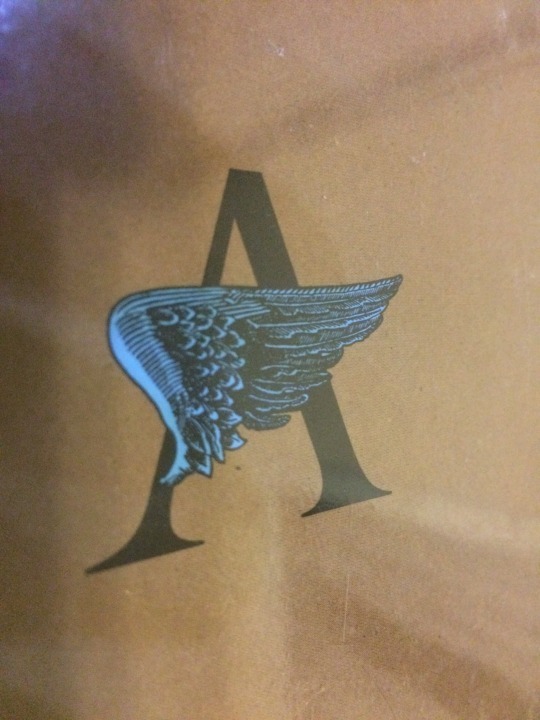
I couldn’t afford such a spectacular edition then, thick-spined, beautifully-boxed, and premium-priced, without outing myself to my parents who would surely ask what the money would go to buy—and it being so divinely shrink-wrapped as it was, I couldn’t just open it up and read it, sitting between the shelves or in the corner of the coffee shop of this soon-to-close bookstore franchise. So I visited my Middle School Library, where I found Perestroika, (the second of two plays comprising Tony Kushner’s two-part epic), there, waiting for me, in accessible, uncensored, open air. (Only later would I score myself a copy of Millennium Approaches, the first of the two parts, at the central county library.)
Yes, I read Angels in America backwards; so it was all grounded angels and dying men and great work and falling apart—and none of the hurtling lovesick, forward at first for me. I had to read the speech given by the “Oldest Living Soviet” before I could scan the sermon of the all-too-familiar Rabbi; and I had to end the great journey, before it had even begun. Characters found hope before they were hurt (or hurt), and healing before they harmed (or were harmed)—in diastole a beat before systole, already progressing long before those same hearts had ever been first broken. It was difficult, then, at the end of the end, to begin again, at Kushner’s actual beginning, where he first introduced the argument he only reveals and concludes in the final, last line of Perestroika—when he returns to the pain that must empower progress. The poverty of the chronology of my reading was an inherent setback, forcing me to return in Millennium Approaches to the illness that Perestroika had salvaged into health, and the pain that, in the latter-half of the play, becomes latter-day progress—working backwards against Kushner’s robust argument, directly challenging the dialectic Kushner romanticizes, poeticizes into a matter of hearts, the heart; a play that ends with life begins with death, and it is too, too hard (both to follow the line of argument and to go on the characters' narrative journey) to experience the plays in reverse. I do not recommend it.
I will finally see a performance of Angels in America this fall on the day of Yom Kippur, which commemorates Jewish mourning, sins, guilt, all such fallen things. Fitting, perhaps, for a play which seeks to prove the pertinence of history’s fallen—of pain, to progress, (in a way no other play seems to have made so strongly since Antigone made her claim or the maidens first became suppliant,). I will see the play instead of attending afternoon Yizkor services, when I am meant to light a candle in remembrance of and mourning for my late father.
Why is there still no play to me but Angels, (though Brecht is loved, Miller is worshipped, Shakespeare is memorized, and Euripides is lionized)? Why is it this play’s dramaturgy of heartbreak that renders me breathless, and its playwright the one whose epigraphs I follow to their sources, near-blindly? If a book is, (but for the HBO adaptation which premiered in our later years), the only form Angels has taken for the relatively young—and if a book is a key to unlock a door to a secret passageway from the As-Is World toward Wonderland—why did we (do we) choose this Wonderland (passageway, door, lock, book, etc.)—a derelict hospital wing of forgotten, fractured, and fallen angels—ailing angels who never had wings, and black nurses born quite problematically into a world awash in whiteness? Why do we wish ourselves (through the act of reading and re-reading) into a world of corrupted bureaucrat-angel courts and heavens that can’t even hear our prayers over the static from their broken radios—rather than, say, to Hogwarts? Why do we children born the morning after “morning in America” re-read ourselves into the mise-en-scène of Angels: a Republican regime redolent of plague in all spheres, when our queer sisters, brothers, and not-cis-ters lived and died under the crosshairs of an Axis of Fear? Why do we—why did I—allow this play to so transform our vision and perception to the extent that it has, so that when reading Aristotle, Tolstoy, Foucault, Arendt, Hegel, Althusser, Molière, or even Shakespeare, we find ourselves cross-referencing their words with those of Mr. Kushner—our grandest litmus test?
Perhaps it is just the high-falutin’ aesthetics which Kushner so grounds to reality with alienating, vaudeville-theatrics. Perhaps it’s the hot, illicit, sometimes sadomasochistic sex in the dark shadows between men (and, yes, at one point, thank goodness, women) who would not ever, perhaps ought not to ever have met. Perhaps it’s the comedy and the camp, or perhaps it’s the drama done in drag. Perhaps it is the feeling of all the aforementioned dramatists—alongside Williams and von Horváth and Goethe and Kleist (and Baldwin and Melville) and all the rest, making theatre and love (perhaps en ensemble) in a rusty, definitely New York autumn. Perhaps it’s because of the script maintaining ubiquity without fail at any local franchise of a sole, remaining major bookstore chain. Or, perhaps, it’s the most recent “great play” written; and therefore is the one we who write plays must write against, test our theories to, and hypothesize about, in readings close and wide. It certainly taught me the powers of theatre: the revival of history; the realization of the imaginary; and the familiarization of the strange®.
We return to the text, bound by the bound book, when trying to write, hoping to smell the fog (or is that smoke?) of Kushner’s San Franciscan post-catastrophic heaven. We start again (in the right order, this time) and pray that the Angel, unlike in Kushner’s text, brings not her unwieldy barricade, but an honest-to-Goddess cure. We hope to finally find a definition of that term “Great Work,” (why has there been no complementary lecture, such as the ones Gertrude Stein delivered on the little dog which knew her?)—that revolutionary, flirtatious, and millennial phrase that ends these two Kushner companion-plays, but for which he problematically, Platonically, and pointedly provides us no positive account. We re-read to read the American Angel utter the word “moonlorn” in her climactic epistle in heaven addressed to Prior Walter, right before he descends back to Earth—and awful, wonderful, contradictory life. “Moonlorn” is a word I haven’t been able to find anywhere else, (and I’ve looked—hard,); so I am left assuming (until I’m told otherwise) that it is a neologism of Mr. Kushner’s glittering invention.
The production approaches; so will the book matter less, or will it be as it always was—not when printed and displayed upon shelf as a great work unto itself, but as a hyper-textual, meta-textual, most-dramatic text: today’s greatest work for great-work-beginning? It is a healing thing, to paraphrase Kushner’s forward to a recent translation of Sholem Aleichem’s Wandering Stars, to find oneself in the margins of a masterpiece.
I still can’t afford a copy of Angels in America—not in hardcover, at least… but copies, I have a few, from friends and lovers and stoop sales and classes; and the shelf is looking quite full of them: angels abounding.
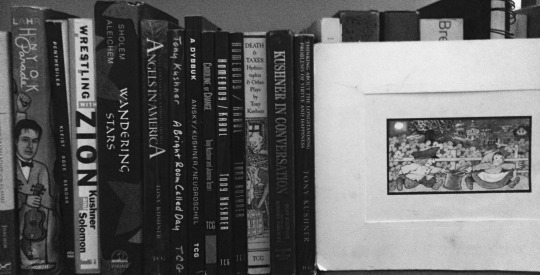
#theatre#angels in america#tony kushner#queer literature#national theatre#essay#gay#a gay fantasia on national themes#national theatre live#playwriting#playwrights#from the archives#origin story#original writing#dramaturgy#drama#dramatists#millennium approaches#perestroika#nt-live#now now now#the great work begins#moonlorn#epistle#heaven I'm in heaven#bad news#best thing on Broadway maybe ever#more life#threshold of revelation
26 notes
·
View notes
Text
I saw the broadcast of Angels in America Part 1 last night and I LOVED IT. The whole cast was good- I liked Andrew Garfield a lot more than I thought I would. Casting so many UK actors is....dicey accent-wise, particularly the guy who plays Louis, but it didn’t bother me too much The standard National Theatre spinny sets work pretty well for the structure of the play.
I’ve never seen ANY stage production of Angels in America though so I accept that I might just be dazzled by that aspect of it. It’s such a different experience from the miniseries (which I love of course). You really feel how much of it is just two people talking to each other, in various configurations and in a live performance, you can really feel how chemistry between the actors can make or break certain scenes.
Bring on perestroika!
4 notes
·
View notes
Text
Angels in America: A Gay Fantasia on National Themes
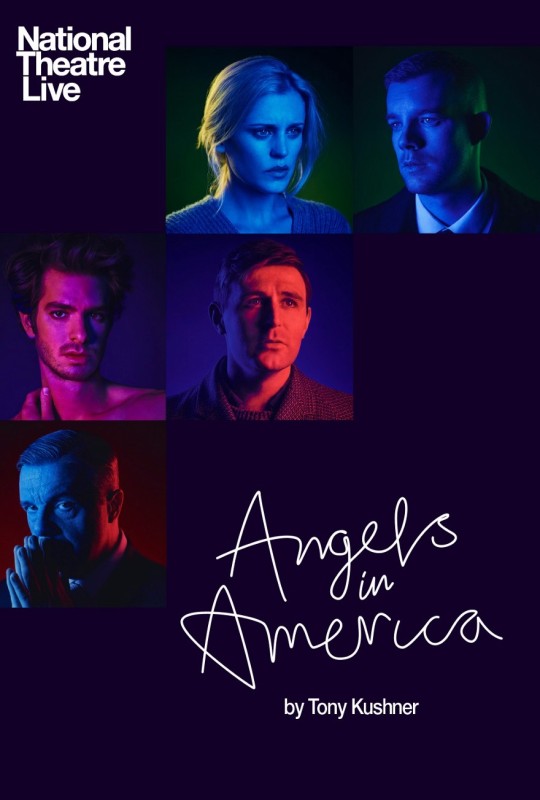
Angels in America is an interesting play for me because it was one that I studied back when I was an undergrad. I still remember being entranced by it when I read it because of how cinematic it appeared on the page (Perestroika in particular). Yes, many of Shakespeare’s plays have the same qualities, as we’ve seen with the countless film adaptations of his work, but Angels read like a movie script instead of a stage play.
The HBO miniseries certainly added to that particular understanding of the play, with its big Hollywood cast (Al Pacino and Meryl Streep!) and location shooting (although it’s metaphorical Heaven leaves a bit to be desired), so I was excited when I saw that National Theatre Live was going to produce the play as a part of its series this year. I was finally going to have the chance to see how the stage can be made into a “live” cinematic experience.
I put live in quotes because the National Theatre Live experience does compromise the experience of a play in the expected manner — the relationship between the audience and the actors is mediated by the cameras, and because I live in Canada, the performance is live to tape. There were times when it felt like the actors were positioned and blocked for the cameras rather than for the live audience.
But that caveat aside, I was mesmerized by the stage design. Millennium Approaches was presented in a minimalist fashion for the bulk of the play. The three positions of the stage were divided into three smaller stages placed on rotating platforms, effectively allowing them to have nine or more different stage configurations at any time. This staging is used beautifully in the scene were Harper and Joe’s scene crosses over into Louis and Prior’s scene. The scenes are meant to happen simultaneously, and in the film context there are many ways to use editing to convey that effect — the Mike Nichols HBO adaptation simply cuts between the two scenes — but this adaptation has the four characters on stage at the same time, with the two corresponding pairs of characters standing in opposition to each other (Joe and Louis as the “villains”, Harper and Prior as the ones being wronged). It’s a wonderfully staged and directed sequence that connects the two stories together in a visual manner.
When Harper enters her Valium induced hallucination and travels to Antarctica with Mr Lies, she “breaks the frame” and moves down stage. A change of lighting hides the sets upstage and you are immediately sympathetic with how she chose to escape the reality of her husband’s closeted homosexuality by being transported to Antarctica with her. All of that with a simple stage direction and lighting changes.
Perestroika’s staging is much more dynamic, but that also reflects the more fantastical nature of the second half of the play. Instead of three rotating platforms on the center of the stage, we see stagehands dressed in black hurriedly scurry across the stage to change the set under the cover of darkness. Even though you can see the stage change before your eyes, the activity helps create a sense of urgency, as each of the stories in the play reach their climax. The stage is also three dimensional — when Prior successfully wrestles the angel and ascends to heaven, he climbs a set of stairs that are slowly raised to the rafters. Moments later, we set a set of stairs pop up from the bottom of the stage and Prior climbs up into heaven itself.
The Angel America is similarly dynamic. In this adaptation, she is carried by several actors in black (credited as Angel Shadows) to give her the illusion of flight, with two other actors flapping her wings. Although you can’t clearly see the actors carrying the Angel, they also don’t pretend that the actors don’t exist. When the Angel is on the ground, you see the Shadows crawling around the ground beside her, giving her an ethereal quality that simply wouldn’t exist otherwise. Certainly this version of the Angel was more interesting to look at than the version we see in the HBO adaptation (simply Emma Thompson in a blue dress with wings).
Admittedly I’ve read more plays than I’ve seen, so my experience with theatre has always been theoretical rather than practical, but seeing a production of Angels in America has opened my eyes to the qualities of theatre that I haven’t really considered. Even though the stage is by definition a static and fixed space, it can still be as dynamic as film. Once you give in to the experience of watching the play, your mind fills in the gaps that would otherwise be filled in a film adaptation. It’s very much in line with Scott McCloud’s theories developed in Understanding Comics, where the imagination fills in the information between the panels. Yes the staging is quite minimalist, but you don’t need anything more a park bench and the sounds of traffic to understand that you are watching scene set in Brooklyn.
I’ve avoided talking about the play itself because I don’t know if I have anything particularly insightful to add to the greater conversation. In the ten or fifteen years since I’ve read it, it’s become a staple of drama courses and academic essays (when Sparknotes and Schmoop have study guides for the play, you know it’s mainstream now). This particular production has also been covered by many of the big outlets, perhaps in part because it stars Andrew Garfield, and I’ve already seen writers trying to make it seem as if it was a contemporary play (Roy Cohn advised Trump). I can see some of the parallels — as America lumbers through the Trump presidency, people have begun to question the nature of America as a project, and the play certainly asks and demands audiences to think about what America represents. For me, the play is very much tied to its time — not just because of when it was set, or the almost naive optimism of the end of the play (Gorbachev’s Perestroika leading to an authoritarian government controlled by oil billionaires was probably not what people expected from the end of the cold war), but because of what queer identity meant at the time. Obviously the battles aren’t over, as Trump’s latest attack against trans soldiers in the military show, but for gay men in the 80s, the very nature of their existence was being questioned. It wasn’t a question of rights — these were men facing extinction. So the hopeful message at the end of the play is meant to be a requiem for the dead, but also an understanding that life will continue. For a play produced in the early 90s, this would have been a powerful message.
I will say, the one aspect of Angels in America that has always stuck with me is how it uses religion. It treats the mythology of the bible as if it were real, so it’s not a question of faith, but a question of why “God” has abandoned humanity. Kushner’s answer to “why do bad things happen to good people?” is that God has simply walked away from his obligations to humanity and heaven, leaving everyone to fend for themselves. I think in this context, the use of Mormonism is apt, since it’s a uniquely American version of the Judeo-Christian mythology that has come to define the “old world”. If America is meant to represent the movement of human civilization, then featuring the newest iteration of the Jesus mythology makes perfect sense. The answer to God’s abandonment is to be in motion, to look forward, and that includes moving past what we assume to be true of God.
This religious aspect of the play has always been in my mind because I read Garth Ennis’ Preacher around the same time as I read the play. I won’t spoil what happens at the end of Preacher, but needless to say that it is also about how God has abandoned his responsibility to his creations and how we must learn to accept and respond to that fact. What specifically made me connect the two seemingly disparate texts was a speech that I remember Roy Cohn making at the end, when he decides to sue God on behalf of the Angels he abandoned:
Paternity suit? Abandonment? Family court is my particular metier, I’m an absolute fucking demon with Family Law. Just tell me who the judge is, and what kind of jewelry does he like? If it’s a jury, it’s harder, juries take more talk but sometimes it’s worth it, going jury, for what it saves you in bribes. Yes I will represent you, King of the Universe, yes I will sing and eviscerate, I will bully and seduce, I will win for you and make the plaintiffs, those traitors, wish they had never heard the name of . . .
(Huge thunderclap)
Is it a done deal, are we on? Good, then I gotta start by telling you you ain’t got a case here, you’re guilty as hell, no question, you have nothing to plead but not to worry, darling, I will make something up.
I was confused when this performance of Perestroika did not include this scene, since having Roy agree to defend God in court is diametrically opposed to what the Saint of Killers does to God at the end of Preacher. Then I saw Kushner state this in the definitive version of the play text:
In previous published versions of Perestroika I included two scenes which were almost always cut in production. In preparing this new version, I decided it was time to acknowledge the verdict of twenty-two years of production history and remove the scenes from the play. I’m including them here for whatever enjoyment and interest they provide readers; the play in production unquestionably works better without them (2013).
(The other scene removed from Perestroika is the one where Prior meets Louis’ grandmother).
I’ll concede that the scene does take away from the final moments of the play, which is redemptive and all about hope. We don’t need to know whether or not God will return, because we will move on with or without him — just as the gay community has developed and grown from the AIDS crisis of the 80s. Indeed, the fact that this play seems dated at times is a testament to how much progress has been made since it was first produced. That said, it’s still a very memorable scene to me because it makes God a “real person”, whatever that might mean, and at least acknowledges that he is accountable for the damage he has done through his neglect of his creation.
I enjoyed revisiting the play, since it was one of the big reasons I developed an interest in drama. Being able to finally see it come to life over a decade later was a bit of a revelation, showing me how powerful live theatre can be and why it still has a place in a world dominated by screens.
The National Theatre Live experience is a decent compromise — it’s still a mediated experience, and your viewing experience is left to the whim of the director, but knowing that the experience is live (or even live to tape) allows for that urgent energy to capture your attention. It solves a long-standing problem I have with live theatre, that it should be recorded and made accessible to more people, and I can only hope that eventually theatre companies will begin to sell performances for home exhibition.
(There will be a North American encore of Millennium Approaches on August 5th and of Perestroika on August 13th at select theatres)
1 note
·
View note
Text
Angels in America Part Two: Perestroika review
Directed by: Marianne Elliott
Written by: Tony Kushner
Starring: Andrew Garfield, Nathan Lane, James McArdle
My rating: 5/5
Following his encounter with an angel, Prior (Andrew Garfield) becomes a prophet; Roy (Nathan Lane) greedily hoards his stash of AZT; and Louis (James McArdle) breaks Joe (Russell Tovey’s) heart.
The disjunction between reality and dream becomes even more pronounced in Part Two of Angels in America, a surrealist playground where philosophy swings, theology seesaws and politics bounds over climbing frames. Where the staging was rigidly delineated into separate spheres, it now engulfs us in its cavernous depths; the neon barrier of Prior’s feverish subconscious is compromised, permeated by his ex-lover Belize (Nathan Stewart-Jarrett), who sits alongside him on the bed as an angel flaps her fluttering, iridescent wings. The gravitas of Prior’s spiritual awakening – rendered by this divinity mounting a trembling, shrieking Garfield – is, as we’ve come to expect, punctured by bathetic humour. “You fucked her?” Belize asks, appalled. “She fucked me,” Prior retorts, with an indignant swipe of his Grim Reaper-black cloak. “First goddam orgasm in months and I slept through it,” he quips. Even Joe who, until now, has eluded retreating into fantasy, experiences his first jolt into the imaginary: a guilty vision of his wife Harper after he has consummated his relationship with Louis.
There’s a glorious moment, towards the end of this sprawling, majestic play, when Prior and Harper are in heaven (metaphorically linked to San Francisco, that centre of LGBTQ culture). After he has ascended the candy-pink stairway to paradise, Prior describes his surroundings as a place of “unspeakable beauty”. Little does he know that, being sutured into the radical, whimsical, hopeful world of Angels in America, he is a character within such a landscape.
This is the closest theatre ever comes to perfection. With its searingly insightful meditations on life and love, stasis and progression – alongside its wicked streaks of dark comedy – Angels is a revelation, a transformative experience I will cherish for years to come. The National Theatre Live programme does not currently offer DVDs of its filmed content for some inexplicable reason (given that there is a clear market for these profit-spinning media), so I will be going again in August to revel in this artistic splendour one last time, and attempt to tease out further meaning from its rich, far-reaching references. There may not be angels in America, but a slice of heaven awaits all those who attend this transcendent production.
As part of NT Live, final encore performances of Parts One and Two of ‘Angels in America’ will be shown in select cinemas on 8 and 15 August. See you there.
1 note
·
View note
Text
Love, feathers and all the jazz. Review of ‘Angels in America: A Gay Fantasia on National Themes’, play by Tony Kushner

New York. America. 1980s. AIDS crisis. Reagan's conservative administration. And in the middle of it people wrestling with
life, death. Falling in and out of love. Having sex. Discovering themselves. Reaching heaven and hell. Prior Walter, Luis
Ironson, Belize, Joe and Harper Pitt, Roy Cohn touch each other's lives in the strangest ways. Politics, religion and things in between...
What could go wrong, right? Oh, and there's an angel (although it reminds more mad creature, a fallen bird than magnificent and
mighty angel descending from heaven in glory) and a prophecy (and it gets even more interesting from that moment).
Tony Kushner's play takes a spin at the National Theatre and it's funny, odd, sad, moving and packed with emotions.
Andrew Garfield's Prior is fabulous, terrified, stricken, heartbreaking, yet hopeful. It's one of these performances that give you chills, the one you watch holding your breath. But he's not the only one shining onstage. Russell Tovey makes his Joe naive, lost. Joe's awakening is painful, freeing, full of contradictory feelings, yet not annoying. Annoying is the “ideas man”, secularized Jew, “mister know it all”, “the drama queen of all”: Luis. And James McArdle shows all his colours perfectly. Denise Gough's Harper is a mess, she's troubled, she's lost and hurt. And Belize played by Nathan Stewart-Jarrett is so sassy, he's the fairy godmother of sorts in this play (considering the fact that he's playing Harper's hallucination, travel agent, granting her wishes). And he's one fine fairy.
The stage splits, moves and opens up, showing countless possibilities and depth beyond depth. It's functional, simple,
but appealing, with metal construct in the shape of America lurking above. Lights flickers, magic happens onstage. A tale of love, sacrifice, loyalty, beliefs, good, bad and ugly is told in unorthodox way. This play is a must see. One of the most important plays in 20th century and its postulates still stand. Now maybe more than ever.
______________________________
Angels in America: A Gay Fantasia on National Themes
Part One: Millennium Approaches & Part Two: Perestroika
by Tony Kushner
dir. Marianne Elliott
now playing in National Theatre
#angels in america#national theatre#angels in america: a gay fantasia on national themes#millennium approaches#perestroika#tony kushner#andrew garfield#russell tovey#james mcardle#denise gough#nathan stewart-jarrett#nathan lane#amanda lawrence#susan brown#marianne elliott#london#play
1 note
·
View note
Video
youtube
National Theatre | How to see Angels in America
The Angels Ballot presented by Delta https://www.nationaltheatre.org.uk/shows/angels-ballot-presented-by-delta Day tickets https://www.nationaltheatre.org.uk/help-centre/tickets#day-tickets NT Live (Part One) http://ntlive.nationaltheatre.org.uk/productions/61490-angels-in-america-part-one-millennium-approaches NT Live (Part Two) http://ntlive.nationaltheatre.org.uk/productions/61491-angels-in-america-part-two-perestroika
New video of Andrew Garfield
7 notes
·
View notes
Photo
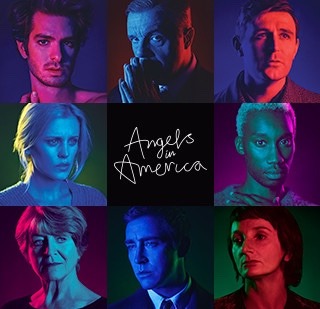
Shows #9 and #11: ANGELS IN AMERICA Don’t be fooled. If you think that just because you experienced the National Theatre’s production of Tony Kushner’s masterwork, ANGELS IN AMERICA, when it was screened via live broadcast from London, you would be WRONG. While you may have enjoyed it on the big screen, nothing could prepare you for what it’s like to see it live—in a real-life theatre breathing the same air as this magnificent ensemble of actors. So, if you saw the screening and think there’s no need to see it live, change your thinking and get yourselves a ticket while you still can. Marianne Elliott’s revival may not have the sophisticated technical design that made her Tony-winning productions of WAR HORSE and THE CURIOUS INCIDENT OF THE DOG IN THE NIGHTTIME that made them a feast for the eyes as well as the soul; but what we get is a finely-tuned ensemble richly performing some of the most complex characters created for the stage. Elliott’s work with actors was greatly evident even in WAR HORSE and CURIOUS INCIDENT, but she’s outdone herself here. The entire London cast has crossed the Atlantic for this limited Broadway engagement, with the exception of Russell Tovey whom has been replaced by an outstanding Lee Pace (it should be said that Tovey was the first Joe I’ve found so sympathetically played, and I was initially disappointed that he wouldn’t reprise his performance—but Pace is even more believable than Tovey was, and turns in an emotionally naked performance that stuns). Andrew Garfield and Nathan Lane, who were the headliners in London, are here—each turning in towering performances that have only deepened in the months they’ve inhabited these roles, and (especially in Garfield’s case) benefit from being seen onstage rather than on a giant screen. There were complaints about the broadness of Garfield’s portrayal of Prior Walter, but he is superb here—turning in one of the finest stage performances I have ever seen (and let’s not forget that less than a week ago I saw Glenda Jackson and Laurie Metcalf sublimely play THREE TALL WOMEN). Lane’s Roy Cohn is a ferocious monster. There’s no question he lands the humor perfectly (and as one of the Prior heralds he is hilarious), but those who have only experienced musical comedy Nathan Lane will be surprised at the complexity of the performance he gives. In PERESTROIKA, he is an absolute marvel. The rest of the ensemble impresses even more than they did in the screening. Denise Gough, as Harper, proves that it IS possible to be better than Mary-Louise Parker in the role. Her performance is riveting throughout, but never better than in her moments opposite Garfield and in her final monologue at the end of PERESTROIKA. Nathan Stewart-Jarrett’s Belize continues to be spectacular, and Amanda Lawrence a terrific Angel, et al (in an interesting twist, Lawrence was absent for the second part; in her place I was treated to a very different, but equally brilliant Beth Malone—the Tony-nominated star of FUN HOME). Two performers who did not impress me as much in the screening but who blew me away live were Susan Brown and James McArdle as Hannah and Louis, respectively. Brown’s track is likely the hardest in the show, back and forth between sexes and the fantastical versus realistic. She’s a force. Her Hannah is every bit as astounding as Streep’s. McArdle takes a character that comes across as ridiculously overbearing in some performances as almost endearing, and he manages to beautifully balance his performance so that even when he does awful things you still feel for him. If the spare design seems confusing, you’re not alone. If Ian McNeil’s set is meant to evoke the crumbling of America as millennium approaches, it certainly does so—but when scene locations go from sparse to fully realized with no explanation, it tends to baffle. Still, it’s wonderful to see the Angel so differently rendered than the original production. It is theatricality at its finest. But who cares? With performances as deeply transformative as the ones given by this ensemble, they need little more than the open space they’re given to deliver Kushner’s immensely complex words. Their ability to make a 25 year old play feel as fresh as it did when it first opened is a magnificent achievement.
0 notes
Text
Highlights include John Pizzarelli with Catherine Russell, Paul Taylor Dance Company, Blind Boys of Alabama Christmas Special, and Thompson Square Duo
Great Barrington, Mass.— Mahaiwe Executive Director Beryl Jolly announces additions to the performing arts center’s fall and winter schedule, including John Pizzarelli with Catherine Russell, Paul Taylor Dance Company, Blind Boys of Alabama Christmas Special, and Thompson Square Duo, along with Bolshoi Ballet in HD and London’s National Theatre in HD broadcasts. Tickets to the live events go on sale to Mahaiwe members on August 3 and to the public on August 11. Tickets to the Bolshoi Ballet in HD and London’s National Theatre in HD broadcasts go on sale to Mahaiwe members on August 23 and to the public on August 25.
“For the past dozen years, the Mahaiwe has presented world-class, year-round programming that’s contributed to the transformation of Great Barrington. People now come every season from near and far to attend our events and enjoy the creative vibrancy of downtown Great Barrington,” says Jolly. “We’re excited to add the breadth and variety of these fall and winter offerings to our 2017 season slate: from country music to iconic modern dance, plus great southern gospel and quintessential jazz for memorable holiday celebrations. The Mahaiwe team is also delighted to bring more arts education programs into local schools, with the workshops by the Paul Taylor dancers in addition to our annual hip-hop residency. The magic continues!”
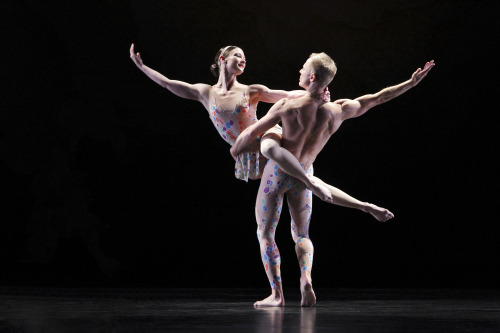
Paul Taylor Dance Company (Photo by Paul B. Goode)
Over Columbus Day weekend, Paul Taylor Dance Company will celebrate its tenth consecutive season of performances at the Mahaiwe on Saturday, October 7 at 8:00pm and Sunday, October 8 at 2:00pm. One of the seminal artists of our time, Paul Taylor continues to shape the homegrown American art of modern dance that he has helped define since becoming a professional dancer and pioneering choreographer in 1954. The program will include three pieces: Set to music by Richard Wagner and Heinrich Baermann, Paul Taylor’s Roses (1985) is a paean to love and relationships in various stages. Set to Vivaldi’s “The Four Seasons” recomposed by Max Richter, Continuum (2017) is an abstract work by Taylor alumna Lila York, commissioned through Taylor Company Commissions and made on the Taylor dancers, about finding peace in a hostile environment. Paul Taylor’s Arden Court (1981) is one of the exuberant dances from his highly acclaimed collection of works set to baroque music. Music by William Boyce accompanies this look at three kinds of relationships: supportive, competitive, and flirtatious. Tickets are $10 to $65.
In partnership with Jacob’s Pillow Dance, Suzanne Carbonneau will offer brief pre-show talks one hour before each performance. Carbonneau is a dance scholar and Paul Taylor’s biographer. Admission is free for performance ticket holders.
In addition, the Mahaiwe’s education program will present workshops by Paul Taylor dancers at four Berkshire County schools on Thursday, October 5 and Friday, October 6. These workshops will offer insights into the athleticism and artistry for which the Paul Taylor Dance Company is known. “Students will deepen their understanding and appreciation of dance as an art form, and of Paul Taylor as one of the most influential modern dance choreographers,” says Jolly.
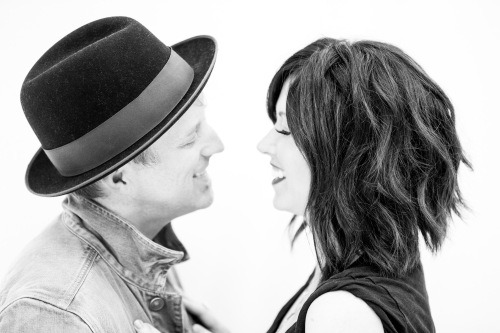
Keifer and Shawna Thompson are Tompason Square Duo.
International Country music stars Thompson Square Duo will perform on Friday, November 3 at 8:00pm. “The duo of Keifer and Shawna Thompson are a force to be reckoned with in modern day Country music,” says Jolly. Thompson Square has topped the radio charts across the Unites States, Canada, and Australia with #1 hits “Are You Gonna Kiss Me Or Not,” “If I Didn’t Have You,” and “Everything I Shouldn’t Be Thinking About” respectively. Tickets are $30 to $55.
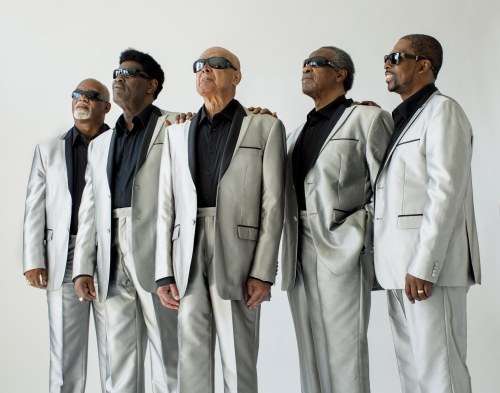
The Blind Boys of Alabama
Blind Boys of Alabama Christmas Show featuring Preservation Hall Legacy Horns will perform on Sunday, December 10 at 7:00pm. The Blind Boys first rose to fame in the segregated south with their thrilling vocal harmonies and roof-raising live show. They released their debut single, “I Can See Everybody’s Mother But Mine,” on the iconic Veejay label in 1948, launching a 70-year recording career that would see them rack up five Grammy Awards (plus one for Lifetime Achievement), enter the Gospel Music Hall of Fame, collaborate with everyone from Mavis Staples and Stevie Wonder to Prince and Lou Reed, and perform on the world’s most prestigious stages. Tickets are $30 to $67.
John Pizzarelli Quartet with Catherine Russell will present “Billie & Blue Eyes” on Saturday, December 23 at 8:00pm. In this program, Catherine Russell’s Grammy Award-winning vocals and John Pizzarelli’s smooth quartet pair to evoke the glory days of jazz, taking on two of the greats: Billie Holiday and Frank Sinatra. This unforgettable evening features soulful interpretations of chart-topping classics like “All of Me,” “God Bless the Child,” “Witchcraft,” and “One More for My Baby.” Instead of stepping back in time, these artists pull the music gracefully into the present, and do it all with their signature panache. Tickets are $30 to $100.
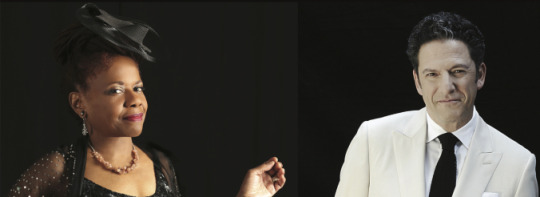
Catherine Russell and John Pizzarelli
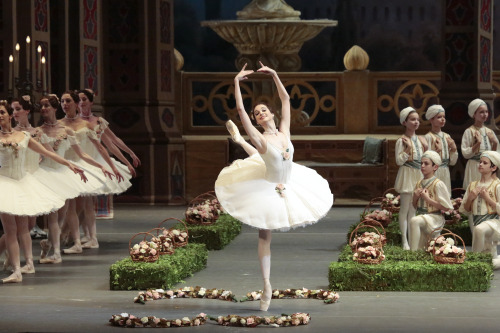
Anna Nikulina in the Bolshoi Ballet’s production of “Le Corsaire.” Photo: Damir Yusupov
The 2017-18 Bolshoi Ballet in HD season presents the greatest classics restaged by today’s most celebrated choreographers for a cinema-exclusive experience featuring some of the best dancers in the world. Three historical ballets recreated by Alexei Ratmansky: Le Corsaire(Sunday, October 22 at 1:00pm), Romeo and Juliet (Sunday, January 21 at 1:00pm), and The Flames of Paris (Sunday, March 4 at 1:00pm) will be shown on the big screen alongside John Neumeier’s The Lady of the Camellias (Sunday, February 4 at 1:00pm) and Jean-Christophe Maillot’s riveting The Taming of the Shrew (Saturday, December 2 at 1:00pm). Three timeless classics and audience-favorites will complete the season: Giselle(Sunday, April 8 at 1:00pm), The Nutcracker (Wednesday, December 27 at 1:00pm) and Coppélia (Sunday, June 10 at 1:00pm). A Jacob’s Pillow Dance Scholar will give a pre-show talk 20 minutes before each broadcast. Tickets to the Bolshoi Ballet in HD events, including the pre-show talk, are $17, with $10 tickets available for young people ages 21 and under.
The Mahaiwe will also continue presenting broadcasts by London’s National Theatre in HD. There will be an encore presentation of Tony Kushner’s Angels in America Part One: Millennium Approaches on Saturday, August 26 at 2:00pm and of Angels in America Part Two: Perestroika on Sunday, August 27 at 2:00pm. In this award-winning two-part play, New Yorkers grapple with life and death, love and sex, heaven and hell during the 80s AIDS crisis and a conservative Reagan administration. Directed by Marianne Elliott, the cast includes Andrew Garfield, Denise Gough, Nathan Lane, James McArdle, and Russell Tovey. OnSaturday, September 23 at 7:00pm, there will be a broadcast of Yerma, Simon Stone’s radical production of Lorca’s achingly powerful masterpiece. In it, Billie Piper plays a young woman who is driven to the unthinkable by her desperate desire to have a child. Tickets to London’s National Theatre in HD broadcasts are $17, with $10 tickets available for young people ages 21 and under.
This slideshow requires JavaScript.
In addition to the new shows, the Mahaiwe announces its new season sponsorship by Berkshire Bank. “The bank has been supportive since the theater’s restoration 15 years ago. They have made a tremendous difference with their sponsorship of our arts education programs; they are good neighbors, even offering employee volunteer hours. Their additional support now will help take the Mahaiwe to the next level of excellence,” says Jolly.
“We are so pleased to expand our partnership with the Mahaiwe, which has been offering robust cultural enrichment and educational opportunities to Berkshire County and beyond for many years,” says Lori Gazzillo, vice president and director of the Berkshire Bank Foundation. “Their education program provides first-hand access to a level of performing arts that many of the students would otherwise not experience. We are proud of the long-standing support we have provided and look forward to enhancing our efforts in the coming years.”
The Mahaiwe is located at 14 Castle Street in Great Barrington, Massachusetts. Box office hours are Tuesday through Saturday from noon to 6:00pm and three hours before show times. For tickets and information, see www.mahaiwe.org or call 413.528.0100.
About the Mahaiwe
Located in downtown Great Barrington, Massachusetts, the Mahaiwe Performing Arts Center is the year-round presenter of world-class music, dance, theater, classic films, Live in HD broadcasts, and arts education programs for the southern Berkshires and neighboring regions. The intimate jewel box of a theater opened in 1905. Since 2005, the performing arts center has hosted over 1,000 events and welcomed over half a million people through its doors. More than 18,000 students from 61 different schools have benefited from the Mahaiwe’s school-time performances and residencies. For tickets and information, see www.mahaiwe.orgor call 413.528.0100.
About the Berkshires
Less than three hours from New York City and Boston, the Berkshires offers culture and adventure year-round. The surrounding mountains provide plenty of opportunity for outdoor excursions in all seasons while world class culture and entertainment, along with a deeply rooted food culture and an array of lodging options amidst picturesque towns, set this region apart. For more information, visit berkshires.org.
Mahaiwe Announces Fall and Winter Events
Highlights include John Pizzarelli with Catherine Russell, Paul Taylor Dance Company, Blind Boys of Alabama Christmas Special, and Thompson Square Duo…
#Berkshire Bank Foundation#Berkshire Bank#Beryl Jolly#Billie & Blue Eyes#Blind Boys of Alabama#Blind Boys of Alabama Christmas Special#Bolshoi Ballet#Bolshoi Ballet in HD#Catherine russell#Great Barrington MA#Jacob&039;s Pillow Dance#John Pizzarelli#John Pizzarelli Quartet#John Pizzarelli Quartet with Catherine Russell#John Pizzarelli with Catherine Russell#Keifer and Shawna Thompson#London’s National Theatre in HD#Lori Gazzillo#Mahaiwe#Mahaiwe Performing Arts Center#Mahaiwe Theatre#Paul Taylor Dance Company#Preservation Hall Legacy Horns#Suzanne Carbonneau#Thompson Square Duo
0 notes
Link
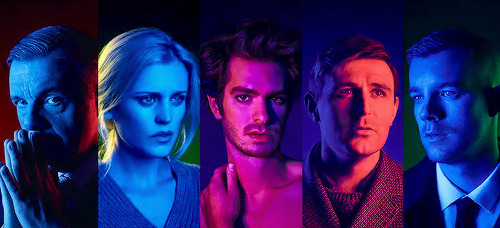
National Theatre Live has just announced the broadcast dates for ANGELS IN AMERICA, Tony Kushner's multi-award-winning two-part play.
Directed by Marianne Elliott (The Curious Incident of the Dog in the Night-Time and War Horse), and featuring Andrew Garfield (Silence, Hacksaw Ridge) as Prior Walter, the cast of the new National Theatre production also includes Denise Gough (People, Places and Things), Nathan Lane (The Producers), James McArdle (Star Wars: The Force Awakens) and Russell Tovey (Being Human).
Part One: ‘Millennium Approaches’ will be in cinemas from 20 July
Part Two: ‘Perestroika’ will be in cinemas from 27 July
89 notes
·
View notes
Text
National Theatre Live 'Angels In America': How Andrew Garfield in London Play Is Broadcasted Internationally
http://styleveryday.com/2017/07/20/national-theatre-live-angels-in-america-how-andrew-garfield-in-london-play-is-broadcasted-internationally/
National Theatre Live 'Angels In America': How Andrew Garfield in London Play Is Broadcasted Internationally
3:01 PM PDT 7/20/2017
by
Ashley Lee
THR outlines the ambitious process taken by National Theatre Live to bring live performances of the two-part epic to movie theaters worldwide.
Those who don’t have tickets to see Andrew Garfield and Nathan Lane in Angels in America have received a miracle, as performances of the sold-out run will broadcast from London’s National Theatre to movie screens worldwide.
The critically-acclaimed stagings of Tony Kushner’s Pulitzer-winning plays, which are set in New York at the height of the AIDS crisis, are presented in two parts: Millennium Approacheson July 20 and Perestroikaon July 27. The breakthrough broadcast initiative National Theatre Live is bringing the live performance to more than 2,500 venues throughout 60 countries.
“It’s a mammoth production, both technically because it’s eight hours of theatre that we’ve got to capture, as well as in the performance required of all the actors for that duration,” says NT Live’s head of broadcast Emma Keith. “But still, there’s a sense of going to an event — you buy a ticket and watch it with other people. And we hope there’s that sense of energy and electricity of a live theatre performance.”
National Theatre Live began when its then-director Nicholas Hytner aimed to replicate the broadcast of his Met Opera production, despite the dismal notion that filmed theatre performances peaked at a low quality. “He said, this could work for the theatre, but we have to approach it with a slightly different mindset: we need to priority the theatre audience that night, put the cameras in the best seats in the house, and film it in an interesting and dynamic way,” recalls Keith.
Its first broadcast bowed in 2009 with a production of Phèdre, starring Helen Mirren, and was seen in theaters by over 50,000 people, which is now considered a broadcast’s breakeven point (any profits are split between NT Live and the production itself). Since then, the company has distributed live productions of the West End’s No Man’s Land with Ian McKellan and Patrick Stewart, Young Vic’s A View From the Bridge starring Mark Strong, and Broadway’s Of Mice and Men with James Franco and Chris O’Dowd, among many others. Its biggest broadcast to date is 2015’s Hamlet which starred Benedict Cumberbatch at the Barbican Theatre and played for 690,000 ticketholders.
Each production is captured by six ultra high-definition cameras capture, jointly guided by each show’s theatrical director and camera director. Only minimal changes like costume colors or lighting are made ahead of a broadcast, and the entire creative team is engaged in doing so. “We’ve tried to be very sensitive to the original productions — it’s not about making it work on camera, but the camera working around the existing production to reach a new and different and broader audience, which is ultimately what everybody wants,” says Keith. Even more so, cinema viewers “can even see the sweat on the actors’ faces, and the emotion and energy behind those performances up close.”
Angels in America is a particularly challenging endeavor, as it’s NT Live’s first true two-parter (previously, they broadcasted two versions of 2011’s Frankenstein in which Benedict Cumberbatch and Jonny Lee Miller alternated the lead role). Broadcasting one week apart (as most live attendees usually prefer to take a break between the two shows), the productions air live throughout the UK and on a slight time-shift in the U.S. and other territories. Though the actors are not usually wearing microphones for the show, they will be to ensure a dynamic sound mix, and the camera movements will aim to parallel the immersive, metaphysical settings onstage.
This broadcast is self-distributed to 700 UK cinemas — which is 90 percent of the region’s theaters, the same as a blockbuster film — and works with Fathom Events in the U.S. and BY Experience internationally.Each theater participating in any live alternative content project must be equipped with high-definition projection abilities and satellite equipment to receive the live signal.
In particular, Angels in America has received a heightened interest in both advanced ticket sales and exhibitions in regards to booking encore screenings. Throughout the U.S., the offering is popular in larger markets like New York City, San Francisco and Los Angeles, “especially because leading up to the July broadcast, there have been a lot of gay pride festivals,”says Julie Borchard-Young, BY Experience co-owner.“The theaters has been smart in using the calendar as a marketing tool to appeal to the LGBT audience and beyond.”
Maybe Angels in America will help move the needle on alternative content events, as the biggest hurdle faced is securing prime booking against opening-weekend movies like Christopher Nolan’s WWII movie Dunkirk and Luc Besson’s sci-fi flick Valerian and the City of a Thousand Planets.
“Hollywood doesn’t see us as a threat but as a complement to those movies, so that other audiences can be reached. We’re not really in the lane of competing with Sony or Disney, but there’s an audience that wants to see movies that speak to them as a cultural segment. The big blockbusters are gonna open around us all the time — we’re never gonna compete with them in that way — but unless you travel to London and buy a ticket, you can’t see these shows. This process democratizes the art for a very broad audience.”
youtube
var quads_screen_width = document.body.clientWidth; if ( quads_screen_width >= 1140 ) if ( quads_screen_width >= 1024 && quads_screen_width < 1140 ) if ( quads_screen_width >= 768 && quads_screen_width < 1024 ) /* tablet portrait */ document.write('<ins class="adsbygoogle" style="display:inline-block;width:300px;height:250px;" data-ad-client="ca-pub-2130935423359143" data-ad-slot="" >'); (adsbygoogle = window.adsbygoogle if ( quads_screen_width < 768 ) []).push();
#America #Andrew #Angels #Broadcasted #Garfield #Internationally #Live #London #National #Play #Theatre
0 notes
Text
National Theatre Live: Angels In America, Part Two: Perestroika
America in the mid-1980s. In the midst of the AIDS crisis and a conservative Reagan administration, New Yorkers grapple with life and death, love and sex, heaven and hell. This new staging of Tony Kushner’s multi-award winning two-part play, Angels in America: A Gay Fantasia on National Themes, is directed by Olivier and Tony award winning director Marianne Elliott.
0 notes